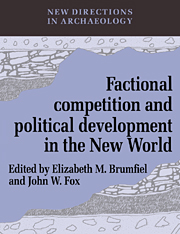Book contents
- Frontmatter
- Contents
- List of figures
- List of tables
- List of contributors
- Preface
- PART I INTRODUCTION
- PART II CHIEFDOMS
- 2 The power of prestige: competitive generosity and the emergence of rank societies in lowland Mesoamerica
- 3 Factional ascendance, dimensions of leadership, and the development of centralized authority
- 4 External warfare and the internal politics of northern South American tribes and chiefdoms
- 5 Chiefdom rivalries, control, and external contacts in lower Central America
- 6 Factional competition and the political evolution of Mississippian chiefdoms in the Southeastern United States
- PART III STATES
- PART IV DISCUSSIONS
- Bibliography
- Index
2 - The power of prestige: competitive generosity and the emergence of rank societies in lowland Mesoamerica
Published online by Cambridge University Press: 18 December 2009
- Frontmatter
- Contents
- List of figures
- List of tables
- List of contributors
- Preface
- PART I INTRODUCTION
- PART II CHIEFDOMS
- 2 The power of prestige: competitive generosity and the emergence of rank societies in lowland Mesoamerica
- 3 Factional ascendance, dimensions of leadership, and the development of centralized authority
- 4 External warfare and the internal politics of northern South American tribes and chiefdoms
- 5 Chiefdom rivalries, control, and external contacts in lower Central America
- 6 Factional competition and the political evolution of Mississippian chiefdoms in the Southeastern United States
- PART III STATES
- PART IV DISCUSSIONS
- Bibliography
- Index
Summary
Introduction
Explanations of the origins of institutionalized social inequality and political privilege must resolve the central paradox of political life – why people cooperate with their own subordination and exploitation in noncoercive circumstances (Godelier 1986:13). In the following pages we address this paradox for an archaeological case from Mesoamerica.
The first chiefdoms in lowland Mesoamerica, the focus of this discussion, appear to have developed some 3300 years ago among the Mokaya in the Mazatan region of Chiapas, Mexico, during the first part of the Early Formative, 1550–1150 BC (all dates are in radiocarbon years). This period also witnessed the adoption of maize agriculture in the coastal lowlands, the founding of sedentary villages, the adoption of ceramic technology, a rapid population increase, and the beginnings of patronized craft specialization.
To explain these developments, we first offer a general model for the development of hereditary rank distinctions as the outcome of competition among political actors vying for prestige and social esteem. We then apply this model to the issues of technological and demographic change in the development of social inequality in the Mazatan region.
Resources, prestige and privilege
It is difficult to imagine why people would voluntarily submit to non-egalitarian political systems. Despite this perception, the institutionalization of political privilege may have been quite simple; it may at first have been in people's best interest. Nowadays, in addressing this issue, we are hindered by hindsight and evolutionist and functionalist thinking that regards change as reaction to existing social problems.
- Type
- Chapter
- Information
- Publisher: Cambridge University PressPrint publication year: 1994
- 204
- Cited by



